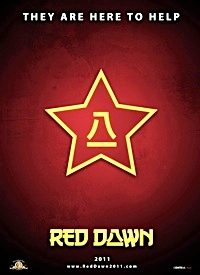
Hollywood is following an old script: hide the crimes of Communism and pretend that Communists are ordinary people. MGB has remade the 1984 film Red Dawn, which described an invasion of the United States by Soviet forces allied with Cuban Communist troops and other allies.
In that film, Communists are portrayed in ways that would be familiar to Poles, Czechs, Hungarians, Lithuanians and others overrun by the Red Army during the Second World War. There are many pitiful and corroborating recounts of what happened then. Rape, not just of German girls and women but of all the girls and women who fell into their hands, was pandemic and tacitly endorsed by the Kremlin. Theft, mayhem, murder, and other crimes were so horrific that it scarred an entire generation of the eastern part of Europe. The maltreatment extended even to those imprisoned in camps by the Nazis, some of whom were transferred almost immediately into the control of the Gulag.
There are a number of books, many published at the time, which chronicle the bestiality of the Communist invaders. Kravitsky, in his 1939 book, In Stalin’s Secret Service, exposed the ugly nature of the regime he could no longer stomach (he was murdered a few years later). Helena Sirkoski, in her 1947 book, The Dark Side of the Moon, gives a chilling and almost unbearable account of what Polish girls, ensnared in the vile apparatus of the Gulag, had to endure. Peter Meyer’s equally troubling 1953 book, The Jews in Soviet Satellites, makes it abundantly clear that the attitude of Communists towards Jews was just as hateful at that of Nazis towards Jews. In fact, the Soviet-occupied parts of Europe after the war welcomed with open arms former members of the Wehrmacht, the Gestapo, and other organs of Nazi power. Victor Kravchenko, in his 1946 book, I Chose Freedom, explains from the perspective of a high-ranking Communist functionary just how brutal Communism was.
That is saying nothing, of course, about the de facto alliance of Bolsheviks and Nazis which led to Communist-led strikes in munitions plants in France —and to Nazis actually shipping anti-Semitic propaganda into the United States using Soviet ships sailing from Vladivostok to San Francisco. Another ex-Communist, Arthur Koestler, in his 1941 book, Scum of the Earth, tells how closely Communists allied themselves with Hitler. Eve Curie, daughter of the famous physicist Marie, describes the treasonous nature of French Communists in her 1941 book, Journey Among Warriors. Jan Valtain, in his horrific autobiography, Out of the Night, describes how he, as a prominent German Communist, was forced to collaborate with the Nazis, then imprisoned and tortured by the Nazis, then betrayed by his Soviet masters. His 1942 book was a bestseller during the war.
Those are just what Communists from other nations have written. How many famous ex-Communists have written detailed stories of the evil of that system? Benjamin Gitlow, Max Eastman, Howard Fast, Eugene Budenz, and Fred Beal, for a start. How many films has Hollywood made about these evils? Almost none. The 1949 film The Red Danube describes the brutal Soviet occupation of their part of Austria and Vienna, which ultimately drives a very young Janet Leigh (an escaped ballerina) to commit suicide rather than face deportation. The 1952 film, My Son John, with Helen Hayes, Dean Jagger, Leo McCarey and a young Robert Walker, showed how maliciously seductive and destructive Communism could be for a young American at college during the 1950s. Walker’s character was persuaded to abandon his country, his family, his God, and finally himself in the muck which Communism brought into America. (This film, by the way, was banned from being broadcast until TMC presented it, with all sorts of nasty comments about “McCarthyism,” a couple of years ago.) The 1959 film The Journey, with Deborah Kerr and including Yul Brenner, Roger Morley, Anne Jackson, and Jason Robards, showed the brutality of the Soviet response to the 1956 Hungarian Revolution — leading up to the utter disillusionment of Major Surov, played beautifully by Brenner. There was really only one film —a short, really — about the Gulag: One Day in the Life of Ivan Denisovich, the only production of this greatest of literary figure’s work. How many films, except for Red Dawn 27 years ago, deal with Communist evil?
So it is no surprise that the remake of Red Dawn, which has Chinese Communist aggressors in the story, has already been watered down, before Beijing even whispered a word. The antagonists now are North Korean, not Chinese. MGB has no desire to make Communists in China unhappy. How Orwellian has all this become? The film is made. Now filmmakers are digitally erasing Chinese flags and military symbols from the film and putting in North Korean flags and symbols. Dialogue is also being changed so that it is clear that the bad guys are not Chinese. When a leaked version of the script reached Chinese hands last year, the Communist newspaper Global Times criticized it.
The entertainment industry — film, television, music — is a mute slave to the horrors of Communism. Nothing which shows collectivism as part of a godless slide into totalitarianism is ever shown to us (those of us who search and read can find the truth, but pity the poor person who tried to learn about Communism from more popular media). There have been countless movies made about Nazi evil, and those continue into this decade. How much richer and deeper is the vein of wickedness in Communism?
The Black Book of Communism estimates that there are 100 million human souls who have died at the hands of Communism. This may be an understatement. The Untold Mao, an account of just how truly diabolical this monster was, indicates that Mao could have come close to killing that many people in China alone. Why is there no film to commemorate this greatest case of mass murder in human history? If the subject is too vast, then why not have a television miniseries, such as War and Remembrance or The Holocaust, both of which dealt movingly with Nazi evil? If the best film is through an enclosed story, such as The Diary of Anne Frank, then there is a sad library of such books — there is plenty of material. Sikorski’s The Other Side of the Moon would fit the bill, as would Kravchenko’s book, I Chose Freedom.
If one wished for more recent material, why not make a film about Anatoly Marchenko’s 1967 book, My Testimony. The world could see much of what was happening to him until he died in the Gulag in December 1983, after being savagely beaten by guards. Or there is No Tears for Mao, a 2001 book by Niu-Niu, a girl who grew up in the nightmarish world of the Great Cultural Revolution. Jaspar Becker’s 1998 book, Hungry Ghosts, tells the long, grim story of 30 million Chinese who starved to death in just a few years of Mao’s long, brutal, murderous reign. There is plenty of material — a veritable ocean of tears and blood shed over the last century — which begs for a film, or a television miniseries or documentary.
How often have we been sanctimoniously instructed that film and television have a “duty” to search out and expose the sins of mankind, no matter how much it hurts us? Well, the entertainment industry and college media professors, when they say that, lie. Nothing in human history has been as monstrous as Communism, and nothing has gotten an easier pass from Hollywood.



